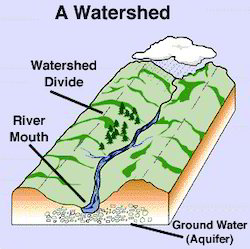Agriculture Notes On – watershed Management – For W.B.C.S. Examination.
The word “watershed” introduced in 1920 was used for the “water parting boundaries”. Watershed is that land area which drains or contributes runoff to a common outlet.Continue Reading Agriculture Notes On – watershed Management – For W.B.C.S. Examination.
Watershed is defined as a geo-hydrological unit draining to a common point by a system of drains. All lands on earth are part of one watershed or other. Watershed is thus the land and water area, which contributes runoff to a common point.
Watershed management implies an effective conservation of soil and water resources for sustainable production with minimum non point resources (NFS) pollutant losses. It involves management of land surface and vegetation so as to conserve the soil and water for immediate and long term benefits to the farmers, community and society as a whole.
Objectives of Watershed Management:
a. Production of food, fodder, fuel.
b. Pollution control
c. Over exploitation of resources should be minimized
d. Water storage, flood control, checking sedimentation.
e. Wild life preservation
f. Erosion control and prevention of soil, degradation and conservation of soil and water.
g. Employment generation through industrial development dairy fishery production.
h. Recharging of ground water to provide regular water supply for consumption and industry as well as irrigation.
i. Recreational facility.
Main Components of Watershed:
a. Soil and water conservation,
b. Water harvesting and water management,
c. Alternate land use system.
Irrigation Projects:
Major – Covered > 10,000 ha of catchments command area (CCA)
Medium-2,000 to 10,000 ha of CCA
Minor-<2,000 ha of CCA
Steps in Watershed Management:
Watershed management involves determination of alternative land treatment measures for, which information about problems of land, soil, water and vegetation in the watershed is essential. In order to have a practical solution to above problem it is necessary to go through four phases for a full scale watershed management.
Please subscribe here to get all future updates on this post/page/category/website


 Toll Free 1800 572 9282
Toll Free 1800 572 9282  mailus@wbcsmadeeasy.in
mailus@wbcsmadeeasy.in



















































































































